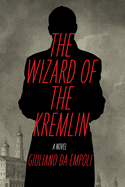
In The Wizard of the Kremlin, Giuliano da Empoli's hypnotic novel-cum-memoir, a former political adviser to Vladimir Putin emerges from self-imposed exile to tell his story as the autocrat's top spin doctor. The book, translated from the French by Willard Wood, is a curious blend of truth and fiction: da Empoli introduces Vadim Baranov, the fictional doppelgänger of real-life Vladislav Surkov, Putin's longtime political and media adviser.
In the novel, Baranov is retired from public life, but a persistent researcher (the narrator) finds the legendary "new Rasputin" and asks for his story. À la Interview with the Vampire, Baranov diffidently indulges him in an epic monologue of personal and political history abounding in caustic yet sage bon mots. Indeed, da Empoli's Baranov is deeply cynical: "the Kremlin doesn't offer happiness, but it does make it impossible to be happy anywhere else" is but one example from a legion of Machiavellian pronouncements. Da Empoli leavens this with Baranov's discursions into the mesmerizing Ksenia, a fleeting, torturous presence who owns his heart but guards her own. Interlaced are Baranov's accounts of Putin's machinations as he catapults from head of the FSB (successor to the KGB) to the "tsar" of all Russia.
Da Empoli's portrait of Putin (in the voice of Baranov) is sympathetic but not overly so. As Baranov sees his golden glow fading in Putin's eyes, he understands the excessive cost of his choices: "A prince's confidence is not a privilege but a death sentence." The Wizard of the Kremlin is smart, sharp, and timelier than ever. --Peggy Kurkowski, book reviewer and copywriter in Denver

